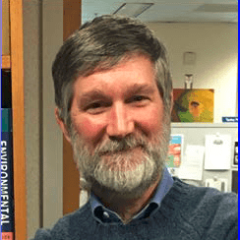Increasing the Accuracy and Quality of Health Data for the Tribes in Oregon
When speaking with Dr. Richard Leman, it only takes a few minutes before you realize that Richard’s knowledge about public health preparedness and response is vast. Richard, a public health physician and Tribal epidemiology liaison, has worked at the Oregon Health Authority (OHA) Public Health Division for nearly 20 years. While consistently working to cultivate long-lasting relationships with the federally recognized Tribes of Oregon, Richard and his colleagues set the stage to link state and Tribal data. Their goal: increasing the quality of data available to Tribal leadership and their allies in several areas, including cancer, communicable diseases, immunizations, and COVID-19.
“It takes relationships, trust, and a mutual vision of what might be useful,” Richard explained. In his role as a Tribal epidemiology liaison, Richard acts in partnership with the Tribes, Tribal organizations, such as the Northwest Tribal Epidemiology Center (NWTEC), and colleagues at the state. While quarterly meetings with Tribal partners and Tribal Health Directors help make sure that mutual Tribal-state goals are being met, Richard emphasizes that he would encourage any Tribal employees working in public health in Oregon to know that he is just a phone call away (971) 673-1089. These collegial relationships, along with a genuine desire to support the Tribes in obtaining quality health information, are what laid the ground work for creating mutually beneficial data linkages.
In the early 2000s, staff from the NWTEC at the Northwest Portland Area Indian Health Board (NPAIHB) approached OHA and began conversations with the 9 Tribes in Oregon around linking cancer and Tribal data. While there are 9 Tribes in Oregon, Oregon is also home to a diversity of American Indian and Alaskan Native peopleNative people in this resource means American Indian and Alaska Native people.. Being able to link state cancer registry data with the Northwest Tribal Registry- a collection of data on patients who have received care from the Indian Health system in the Northwest- would allow Tribes and the state to have a better understanding of the true impact of cancer on Native peoples. To support this work, NWTEC and OHA developed and signed a data sharingData sharing includes obtaining and sharing data. agreement, stating explicitly how data would be used and protected.
After linking the data, state and Tribal partners found that as many as 40% of American Indians and Alaska Natives in the state cancer registry were not documented as such. Having accurate, timely health data allowed the state, Tribes, and other health partners to better meet the health needs of Native peoples and communities. In addition, the success of this data linkage effort prompted state and Tribal partners to use the same process to improve accuracy of data for American Indians and Alaska Natives in the state’s communicable disease databaseDatabases are collections of data..
During the onset of the COVID-19 pandemic, the NWTEC began discussions with Richard about expanding data sharingData sharing includes obtaining and sharing data. agreements in place to include the Immunization Registry and COVID-19 data. This prompted partners to develop an all-encompassing data sharingData sharing includes obtaining and sharing data. agreement that now covers multiple state health databasesDatabases are collections of data., rather than having separate agreements for each one.
The need for culturally responsive COVID-19 case investigation and contact tracing services for Oregon American Indian and Alaska Native communities led Tribes, NPAIHB, and OHA to establish new data sharingData sharing includes obtaining and sharing data. agreements. These allowed the signatories to share information to support COVID-19 case and contact investigation by Tribes and NPAIHB, making it possible to provide more culturally attuned public health and wrap-around services to Tribal members infected with or exposed to COVID-19.
Partnerships between OHA, NPAIHB, and Oregon-based Tribes didn’t stop there. Eight of nine Tribes established memoranda of understanding with OHA, NPAIHB, and the IHS Portland Area Office to ensure that Tribes can receive needed services for laboratory testing, immunization, and communicable disease outbreak investigation. “We, the Tribes, NPAIHB, and IHS have a responsibility to meet the public health needs of the communities we mutually serve. Capturing these commitments on paper in a way that respects Tribal sovereignty and Tribal data sovereigntyis the right each Tribe has to govern the collection, ownership, and application of its own data. It derives from Tribes’ inherent right to govern their peoples, lands, and resources. Principles of Tribal (or Indigenous) data sovereignty can apply to data on American Indian and Alaska Native people off Tribal lands. makes them more durable,” said Richard.
Richard underscores that having memoranda of understanding already in place has allowed Tribes and the state to work more seamlessly together during the COVID-19 crisis. He hopes that these mutually beneficial relationships are just the beginning of long, collaborative relationships that extend far beyond the COVID-19 pandemic.

